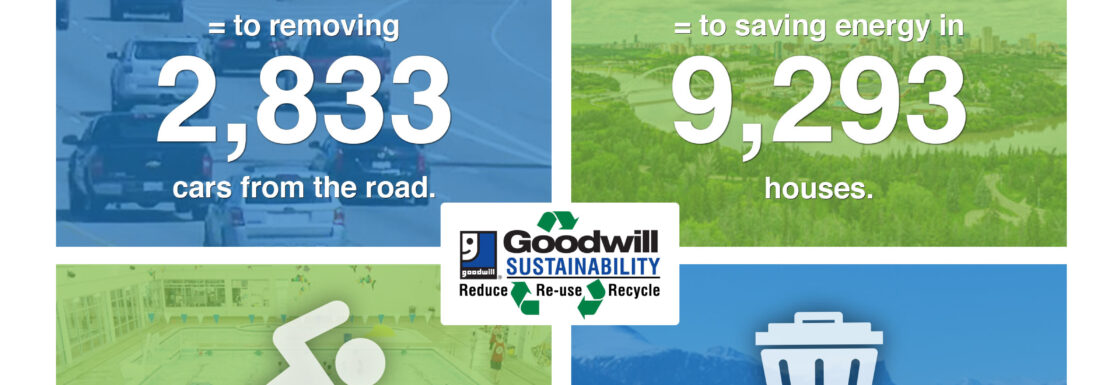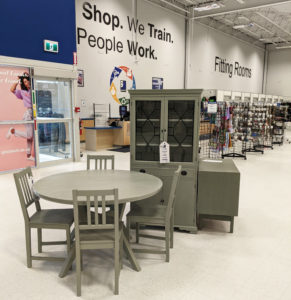A Sustainable Action Plan for GOOD.

Projects Sponsor
Thanks to their Goodwill Impact Centre, home to Alberta’s first Goodwill Outlet store, Goodwill Industries of Alberta annually diverts 90% of all donated goods from landfills in the Edmonton Region and over 19 million kgs of donated goods provincially.
Customers have one last chance to purchase donated goods which gives the items a second chance and reduces the volume of waste. Refurbishing and repurposing goods in their new hub makes would-be trash into treasure makes would-be trash into treasure. The Goodwill Impact Centre is at the centre of Goodwill’s commitment to continuously improving its sustainability action plan in order to become a Zero Waste organization.
In 2015, in line with the organization’s goal of reducing its environmental footprint, Goodwill Industries of Alberta envisioned a sustainability centre of excellence. They wanted to find a way to consolidate many of their Edmonton area operations in one place and were keen on finding yet more ways to divert waste from the landfill. They also wanted to ensure that they were creating employment opportunities for Albertans with disabilities.

Goodwill’s goals for the Impact Centre were as lofty as they were laudable. They wanted to give their customers one last chance to re-use and purchase items at a very reasonable cost and increase the volume of items recycled and resold. The planned Goodwill Outlet store at the centre promised to curtail the amount of waste generated the company sends to landfills, reducing waste management operations.
As well, Goodwill’s plan for the centre involved developing innovative collaboration programs with other agencies and organizations in order to create a new use for items they had not managed to sell. By renovating furniture and adapting bicycles for use by disabled children, for example, Goodwill knew they could give discarded items a second, useful life. This practice not only prevents waste directly but bringing an item back rather than binning it saves the earth from the carbon emissions generated by manufacturing these goods from scratch.

Beyond the wheeling, dealing, nuts and bolts side of the Impact Centre, Goodwill wanted it to act as the main ground for designing and promoting sustainability practices for all the stores and offices within Alberta. Energy conservation has long been a priority for the organization and an in-depth understanding of its footprint helped lay the groundwork for the Goodwill Impact Centre. Goodwill’s daily waste and recycling audits allowed them to establish the baseline year and determine the areas for improvement. Energy Audits were performed at most Goodwill sites, along with a carbon inventory. Third-party organizations like Green Economy Canada and the City of Edmonton were engaged to gather data relevant to Goodwill’s energy performance. They began collecting key performance indicators related to energy and waste on a monthly basis, information that was then audited by both their finance team and KPMG.
Meetings with the Senior Leadership Team and recycling companies facilitated the drafting of Goodwill’s first Sustainability Action Plan, which helped establish recycling guidelines for their operations. A carbon inventory was made and more importantly, a Sustainability Training program was developed for Goodwill Team Members. This was done in order to help keep the eight hundred plus Goodwill Team Members motivated. Every day this work is paying off in so many ways.
Since the opening of the Impact Centre in 2017, Goodwill’s recycling practices have expanded to electronics, appliances, books, plastics, lightbulbs, and batteries and the list continues to grow. As well, Goodwill has started a repair program for broken furniture (Repair for Good) and a program to enhance the micro-mobility of disabled children (You Can Ride 2) in the Edmonton area.

As part of Goodwill’s commitment to continuously improving its sustainability action plan, in order to become a Zero Waste organization, the Impact Centre recently launched a program for mending damaged Goodwill uniforms, instead of discarding and buying new ones.
The Goodwill Impact Centre is at the centre of Goodwill’s commitment to continuously improving its sustainability action plan in order to become a Zero Waste organization.













